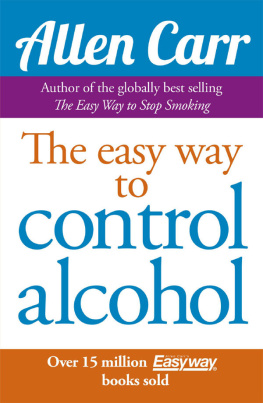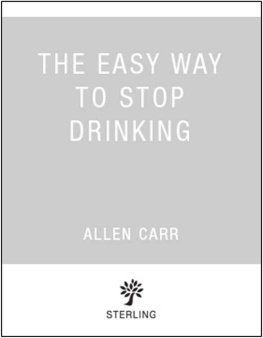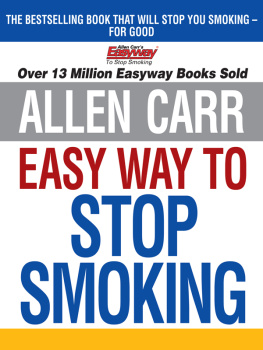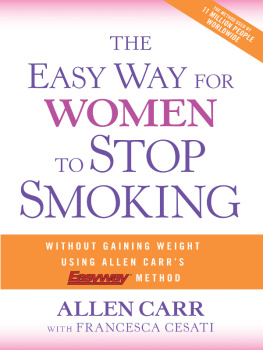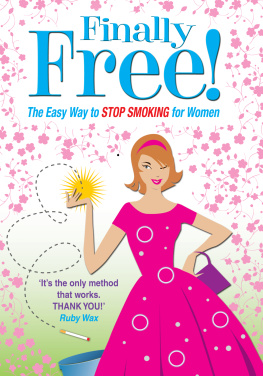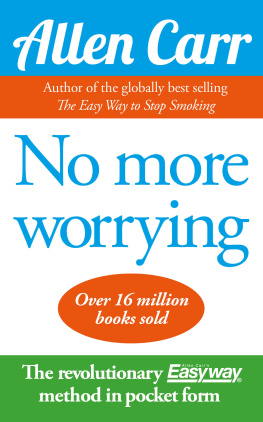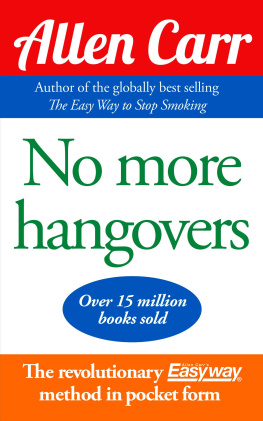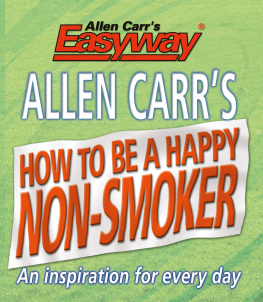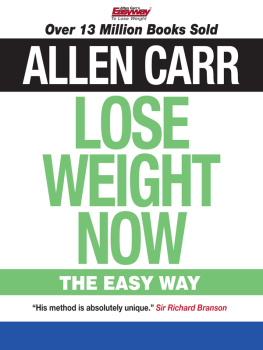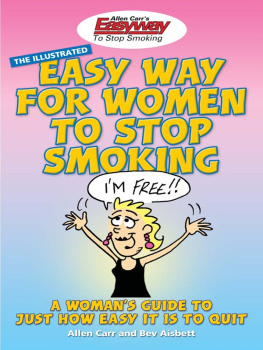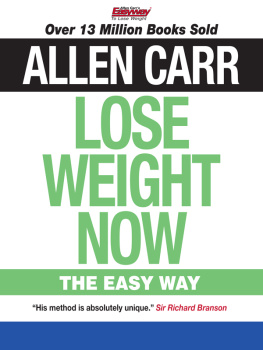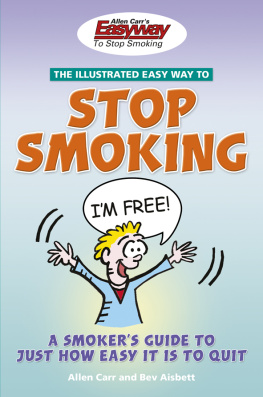Allen Carr
The easy way to
control alcohol
ALLEN CARR
Allen Carr was a chain-smoker for over 30 years. In 1983, after countless failed attempts to quit, he went from 100 cigarettes a day to zero without suffering withdrawal pangs, without using willpower, and without putting on weight. He realized that he had discovered what the world had been waiting for the Easy Way to Stop Smoking, and embarked on a mission to help cure the worlds smokers.
As a result of the phenomenal success of his method, he gained an international reputation as the worlds leading expert on stopping smoking and his network of clinics now spans the globe. His first book, Allen Carrs Easy Way to Stop Smoking, has sold over 12 million copies, remains a global bestseller and has been published in over 40 different languages. Hundreds of thousands of smokers have successfully quit at Allen Carrs Easyway Clinics where, with a success rate of over 90%, he guarantees youll find it easy to stop or your money back.
Allen Carrs Easyway method has been successfully applied to a host of issues including weight control, alcohol, and other addictions and fears. A list of Allen Carr clinics appears at the back of this book. Should you require any assistance or if you have any questions, please do not hesitate to contact your nearest clinic.
For more information about Allen Carrs Easyway, please visit
www.allencarr.com
DEDICATED TO THE FELLOWSHIP
AND
My special thanks to Crispin Hay, whose expertise and assistance have been invaluable.
CONTENTS
INTRODUCTION
On 15 July 1983 Allen Carr, a confirmed chain-smoker for a third of a century, extinguished his final cigarette and announced that he had discovered a method of stopping which would enable any smoker to find it easy to quit: immediately and permanently, without using willpower, gimmicks or substitutes; without suffering withdrawal pains or gaining weight; and, most important of all, without spending the rest of their lives resisting the craving, believing that social occasions will never be quite so pleasant and that stress will not be so easy to handle without a cigarette.
At the time few could believe that such a seemingly magical cure was possible. After all, it was common knowledge that quitting smoking required the use of immense willpower, was usually accompanied by weight gain and horrendous withdrawal symptoms, and was about as easy as climbing Everest. Sadly, millions of smokers still suffer from this illusion.
Considering the thousands of hours and the millions of pounds the medical profession had spent on searching for an effective method to quit smoking, it is understandable that no one could believe that a lone ex-smoker, with no medical training whatsoever, had succeeded where they had failed. Members of Alcoholics Anonymous will find this concept easier to accept. As a former member of AA, I can confirm that literally millions of alcoholics would testify that they owe their very lives not to medical experts, but to fellow alcoholics.
Allen Carrs Easyway is now widely accepted as the worlds leading method of helping smokers to quit. Allen Carrs first book, The Easy Way to Stop Smoking, has been a best-seller every year since it was first published by Penguin in 1985. It is now translated into over 40 languages and has been the No.1 best-seller in Russia, Italy, Germany, Austria and Switzerland the list is growing. There is also a worldwide network of clinics based on Allen Carrs Easyway method ensuring that Allens legacy achieves its full potential.
I originally heard about Allen Carrs Easyway from friends who had attended the clinics and were overjoyed by the results. I was completely sceptical; after all some had only quit for a few days. I assumed that they had spent a fortune on the latest miracle cure and were trying to make me fall for the same gimmick, but I knew that time would tell. It seems hardly credible now, but I actually wanted them to fail. It annoyed me that it didnt seem to bother them if I smoked in their presence, and as time went by I began to realize that they were genuinely free and clearly enjoying the fact. Instead of pitying them because they could no longer smoke, I began to envy them. For years Id felt like a social pariah because I still smoked. As a regularly faltering member of The Fellowship, I was fully aware that alcohol was ruining my life. But my justification was that it was an essential social prop. Now I began to feel a social pariah because I was drinking. So I attended an Allen Carrs Easyway clinic. Still convinced that it wouldnt work for me, I didnt even tell my wife, let alone my friends. When I left the clinic hours later, I couldnt wait to tell the world.
I am indeed delighted by this opportunity to testify that he not only enabled me to quit smoking but helped to release me from a nightmare that was controlling and ruining my life: alcoholism. I once believed that there was no cure for alcoholism. Allen proved me wrong. My only regret today is that I didnt learn about Allen Carr earlier. Dont worry if you are also sceptical. Allen would expect you to be. I wont try to tell you how or why this method is so effective. All I will say is that by the time you have finished reading the book, the great mystery in your life will be why you couldnt see it so clearly before. Enjoy the book.
Emanuel Johnson
1 The Easy Way to Control Alcohol
It has been several decades since I proved that any smoker can find it easy to quit. When I discovered my method, I fully expected that smoking would be a thing of the past in a few short years. Indeed since then many millions of smokers have been cured by my method. The vast majority of them found it easy and enjoyable to quit. Nonetheless, there are millions of smokers worldwide who have never even heard of Allen Carr or his method. I can only put it down to the fact that it takes time to turn generally accepted dogma on its head. After all, everyone knows that it is very difficult to stop smoking.
For the majority of human history we all knew that the world was flat and lay at the centre of the universe. Likewise it is common knowledge that for anyone with a drink problem to put it behind them requires a phenomenal effort of will, usually involving several abortive attempts. There is a general belief in society that the only people who really need to control their drinking also happen to be the very ones who find it hardest to do so. If I found it difficult to convince people that there is an easy and enjoyable way to stop smoking, how much harder a task will I have to convince you that anyone can control their drink problem easily, immediately and permanently? Whether your fear is that you are in danger of becoming an alcoholic, or you suspect that you are already one, my task is not helped when Alcoholics Anonymous (AA), the organization widely accepted as the leading authority on the subject, categorically states:
Alcoholism is a fatal illness for which there is no known medical cure.
Unfortunately, this opinion is widely supported by many eminent members of the medical profession, and by the media and society generally. So ingrained is this belief that there is no cure for alcoholism, that you might be excused for despatching this book to the rubbish bin without even reading it. I beg you not to do that. There are many doctors who do not support AAs view, but they seem reluctant to admit to their doubts on national television.
If you happen to be a member of AA or a similar organization, and in your 20th year of recovery, you might be wondering how I can commence this work by contradicting the very cornerstone of AA philosophy, while at the same time dedicating it to The Fellowship. It is because I have the deepest regard for an organization that has saved the sanity and the very lives of literally millions of alcoholics: people who were in the depths of despair, having lost their job, friends, home and family, without any semblance of hope or self-respect. AA welcomes and whole-heartedly supports such people, regardless of race, class, colour, religion or creed. What is more, it does so without judging or incriminating them. Many members attend meetings after a particularly bad day. The atmosphere before the meeting starts would make a dentists waiting room appear like a party. As each member unloads their tale of woe, so the mood changes: laughter becomes more and more frequent and it actually feels like a party, even without alcohol!

